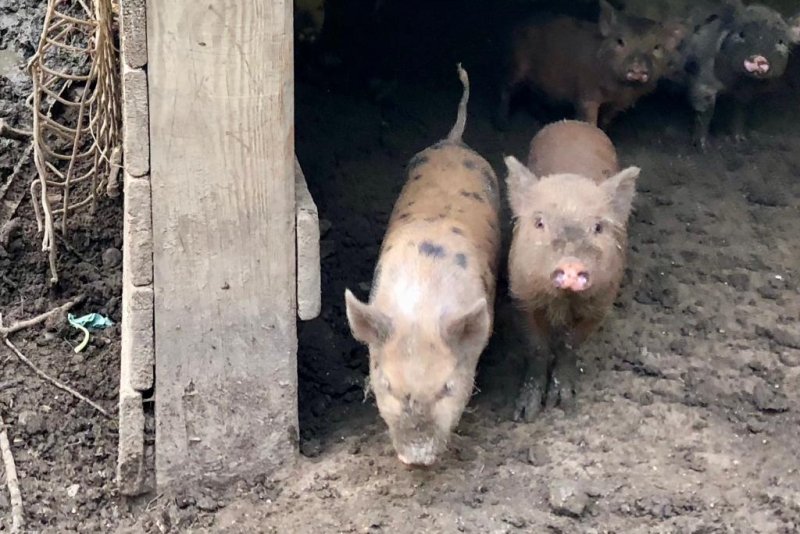Pork industry experts worry about the potential that African swine fever will enter the country through unmonitored shipments of livestock feed from countries with outbreaks of the virus. Photo by Jessie Higgins/UPI
EVANSVILLE, Ind., May 24 (UPI) -- While U.S. Customs and Border Protection scrambles to keep pork products infected with African swine fever from entering the country, experts say the disease could slip through easily another way -- in unmonitored animal feed.
Researchers at Kansas State University recently showed that hogs will become sick after eating feed that has been exposed to the virus. They also showed that the virus can survive in feed ingredients long enough to be shipped from a country infected with the disease to an American farm.
The United States imports millions of pounds of animal feed each year from countries that have African swine fever outbreaks, notably China.
That "makes this pathway important to consider," Megan Niederwerder, an assistant professor of diagnostic medicine and pathobiology at Kansas State's College of Veterinary Medicine, who conducted the study, said in a statement.
"African swine fever is arguably the most significant threat to worldwide swine production," Niederwerder said. The study, she said, "is the first to demonstrate that African swine fever can be easily transmitted through the natural consumption of contaminated feed and liquid."
What makes this threat more credible to the pork industry is that animal feed has carried viruses from China to the United States before.
"Our experience tells us this can happen," said Paul Sundberg, the director of the Swine Health Information Center in Iowa. In 2013, feed contaminated by porcine epidemic diarrhea virus crossed the ocean from China and reached the American herd.
"There were several farms that broke essentially at the same time," said Liz Wagstrom, the chief veterinarian at the National Pork Producers Council. "These farms had nothing in common. They were in completely different states. They didn't use any of the same suppliers. It was really interesting trying to figure out what was infecting them. We eventually traced it back to where the feed came from."
The feed can become contaminated because in many parts of Asia, including China, farmers and exporters dry their soybeans and other animal feed by spreading the food out on the open ground. Beans, for example, can be exposed to manure and other bodily secretions from nearby animals that may be sick, Wagstrom said.
From there, the virus can infect the containers, trucks and even processing plants in which beans are transformed into feed.
It's likely happening already.
"In our communications with people in China, they have found African swine fever in feed there," Sundberg said.
The U.S. Department of Agriculture is not monitoring animal feed for African swine fever, nor is it restricting imports from countries where the disease exists. Wagstrom said no reliable way exists to test feed for the presence of the virus.
The National Pork Board has issued a call for proposals for ways to accurately and efficiently test imported feed. In the meantime, pork industry scientists are encouraging producers to store feed for several weeks to months before giving it to their hogs in hopes that the delay will be long enough for any virus present to die.
If African swine fever is introduced to the United States, it could prove difficult to eliminate.
The disease first was reported in China last fall, has spread to all parts of that country and is spilling into neighboring Asian nations. It is deadly to pigs but harmless for humans. And it is destroying China's hog industry. Experts predict it will claim some 200 million animals by the end of the year -- a major economic blow to the world's most populated country.
U.S. pork producers say they could experience a similar economic blow should the disease infect the American herd. Because no vaccine or treatment has been developed, border security and biosecurity are the only ways to keep America's hogs healthy.
With that threat looming, the agriculture department and Customs and Border Protection have bolstered efforts to keep African swine fever from crossing the border. The virus is known to survive in cooked and cured pork, so CBP recently added more dogs to its "Beagle Brigade" to sniff out smuggled pork products in international shipments and passenger luggage, among other measures.















